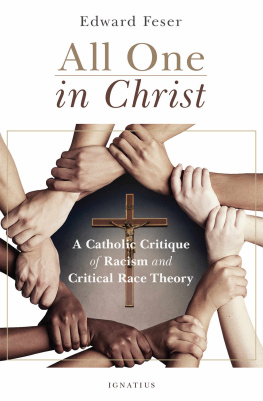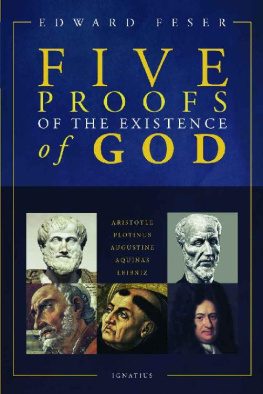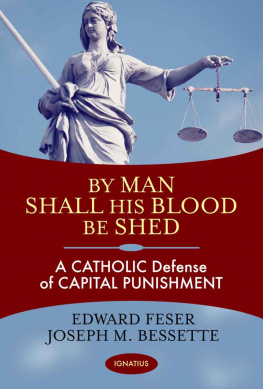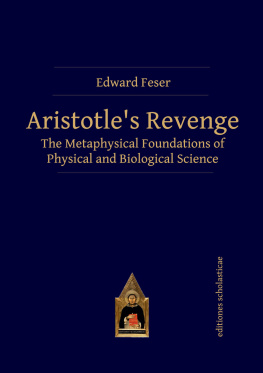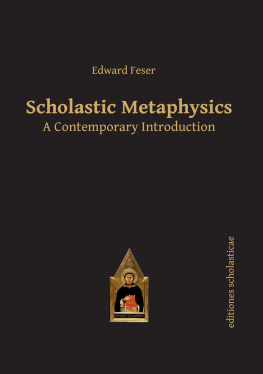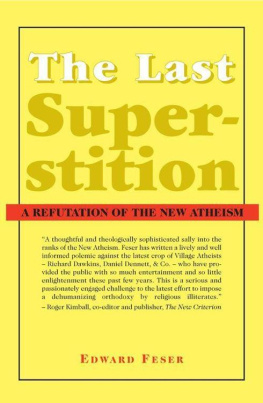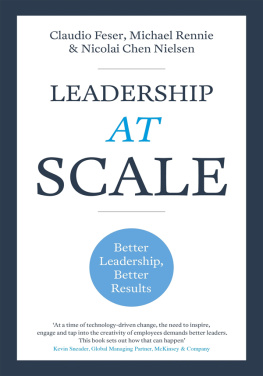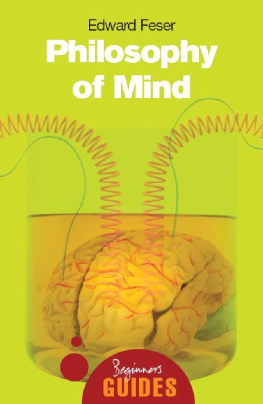Edward Feser - All One in Christ
Here you can read online Edward Feser - All One in Christ full text of the book (entire story) in english for free. Download pdf and epub, get meaning, cover and reviews about this ebook. year: 2022, publisher: Ignatius Press, genre: Politics. Description of the work, (preface) as well as reviews are available. Best literature library LitArk.com created for fans of good reading and offers a wide selection of genres:
Romance novel
Science fiction
Adventure
Detective
Science
History
Home and family
Prose
Art
Politics
Computer
Non-fiction
Religion
Business
Children
Humor
Choose a favorite category and find really read worthwhile books. Enjoy immersion in the world of imagination, feel the emotions of the characters or learn something new for yourself, make an fascinating discovery.
- Book:All One in Christ
- Author:
- Publisher:Ignatius Press
- Genre:
- Year:2022
- Rating:3 / 5
- Favourites:Add to favourites
- Your mark:
- 60
- 1
- 2
- 3
- 4
- 5
All One in Christ: summary, description and annotation
We offer to read an annotation, description, summary or preface (depends on what the author of the book "All One in Christ" wrote himself). If you haven't found the necessary information about the book — write in the comments, we will try to find it.
All One in Christ — read online for free the complete book (whole text) full work
Below is the text of the book, divided by pages. System saving the place of the last page read, allows you to conveniently read the book "All One in Christ" online for free, without having to search again every time where you left off. Put a bookmark, and you can go to the page where you finished reading at any time.
Font size:
Interval:
Bookmark:
ALL ONE IN CHRIST
EDWARD FESER
A Catholic Critique of Racism
and Critical Race Theory
IGNATIUS PRESS SAN FRANCISCO
Unless otherwise indicated, Scripture quotations are from Revised Standard Version of the BibleSecond Catholic Edition (Ignatius Edition) copyright 2006 National Council of the Churches of Christ in the United States of America. Used by permission. All rights reserved worldwide.
Excerpts from the English translation of the Catechism of the Catholic Church for use in the United States of America copyright 1994, United States Catholic Conference, Inc.Libreria Editrice Vaticana. English translation of the Catechism of the Catholic Church: Modifications from the Editio Typica copyright 1997, United States Conference of Catholic BishopsLibreria Editrice Vaticana. Second edition (updated 2016). Used with permission.
Wherever possible, quotations from Church documents are from the Vatican website. If English translations were lacking, quotations were taken from cited books or Papal Encyclicals Online.
Cover photograph iStock
Cover design by Enrique J. Aguilar
2022 by Ignatius Press, San Francisco
All rights reserved
ISBN 978-1-62164-580-1 (PB)
ISBN 978-1-64229-242-8 (eBook)
Library of Congress Control Number 2021952109
Printed in the United States of America
Church Teaching against Racism
Racism is widely, and rightly, condemned today. Indeed, in a world that seems increasingly divided on moral and political issues, that racism is wrong is one of the few things about which there appears to be broad agreement. But what exactly is racism, and why is it wrong? What does the Catholic Church teach on the subject? What does she teach regarding other issues that often arise in discussions of racism, such as slavery, immigration, and nationalism? What should Catholics think about Critical Race Theory and other increasingly influential ideas and movements promoted in the name of antiracism? This book addresses these questions.
In his 1971 apostolic letter Octogsima Adveniens , Pope Saint Paul VI condemned what he referred to as racialist prejudice, and affirmed:
The members of mankind share the same basic rights and duties, as well as the same supernatural destiny. Within a country which belongs to each one, all should be equal before the law, find equal admittance to economic, cultural, civic and social life and benefit from a fair sharing of the nations riches. (16)
This suggests a useful definition of racism, which is best understood as the denial of what the pope here affirms. In other words, racism is the belief that not all races have the same basic rights and duties and / or supernatural destiny and, therefore, not all races should be equal before the law, find equal admittance to economic, cultural, civic, and social life, or benefit from a fair sharing of the nations riches. Racism thus entails giving some races special favor over others in these respects.
The Church has consistently condemned racism in this sense and did so with special emphasis during the twentieth century. In his 1914 encyclical Ad Beatissimi Apostolorum , Pope Benedict XV lamented:
Being as it were compacted and fitly joined together in one body, we should love one another, with a love like that which one member bears to another in the same body.... But in reality never was there less brotherly activity amongst men than at the present moment. Race hatred has reached its climax; peoples are more divided by jealousies than by frontiers. (6-7)
Condemning developments in Nazi Germany in his 1937 encyclical Mit Brennender Sorge , Pope Pius XI wrote:
Whoever exalts race, or the people... or any other fundamental value of the human communityhowever necessary and honorable be their function in worldly thingswhoever raises these notions above their standard value and divinizes them to an idolatrous level, distorts and perverts an order of the world planned and created by God. (8)
In Pacem in Terris , Pope Saint John XXIII called for the elimination of every trace of racial discrimination on the grounds that no one can be by nature superior to his fellows, since all men are equally noble in natural dignity (86, 89). The Second Vatican Council, in the declaration Nostra Aetate , taught:
The Church reproves, as foreign to the mind of Christ, any discrimination against men or harassment of them because of their race, color, condition of life, or religion. On the contrary, following in the footsteps of the holy Apostles Peter and Paul, this sacred synod ardently implores the Christian faithful to maintain good fellowship among the nations (1 Pet 2:12), and, if possible, to live for their part in peace with all men, so that they may truly be sons of the Father who is in heaven. (5)
The 1988 document The Church and Racism: Towards a More Fraternal Society , issued by the Pontifical Commission on Justice and Peace at the direction of Pope Saint John Paul II, observes:
Racial prejudice or racist behavior continues to trouble relations between persons, human groups and nations. Public opinion is increasingly incensed by it. Moral conscience can by no means accept it. The Church is especially sensitive to this discriminatory attitude. The message which she has drawn from biblical Revelation strongly affirms the dignity of every person created in Gods image, the unity of humankind in the Creators plan, and the dynamics of the reconciliation worked by Christ the Redeemer who has broken down the dividing wall which kept opposing worlds apart in order to recapitulate all persons in him. (1)
The Compendium of the Social Doctrine of the Church , also issued during the pontificate of John Paul II, sums up the Churchs condemnation of racism, which is grounded in her understanding of both human nature and the demands of the Gospel:
God shows no partiality (Acts 10:34; cf. Rom 2:11; Gal 2:6; Eph 6:9), since all people have the same dignity as creatures made in his image and likeness . The Incarnation of the Son of God shows the equality of all people with regard to dignity: There is neither Jew nor Greek, there is neither slave nor free, there is neither male nor female; for you are all one in Christ Jesus (Gal 3:28; cf. Rom 10:12; 1 Cor 12:13, Col 3:11).
Since something of the glory of God shines on the face of every person, the dignity of every person before God is the basis of the dignity of man before other men . Moreover, this is the ultimate foundation of the radical equality and brotherhood among all people, regardless of their race, nation, sex, origin, culture, or class.
This twofold foundation of the Churchs condemnation of racismin nature and grace, in our common origin and our supernatural destinyrequires special emphasis and comment, for it differs crucially from the approach taken in many secular discussions of racism.
Defenders of racism commonly posit racial differences of a cognitive, affective, or behavioral sort that they claim are grounded in genetics or other biological factors. Their critics respond that the scientific evidence for such claims is weak. But from the point of view of Catholic theology, to address the issue at this level alone would be superficial. The Churchs condemnation of racism is grounded in considerations about human nature that go deeper than anything that could be either discovered or undermined by biological science. As the document The Church and Racism judges:
The sciences, on their part, contribute to dispelling much of the false evidence used to justify racist behavior.... But the sciences are not sufficient to substantiate anti-racist convictions. Because of their methods, they do not allow themselves to say the last word about the human person and his or her destiny, and to define universal moral rules of a binding nature for consciences. (18)
Next pageFont size:
Interval:
Bookmark:
Similar books «All One in Christ»
Look at similar books to All One in Christ. We have selected literature similar in name and meaning in the hope of providing readers with more options to find new, interesting, not yet read works.
Discussion, reviews of the book All One in Christ and just readers' own opinions. Leave your comments, write what you think about the work, its meaning or the main characters. Specify what exactly you liked and what you didn't like, and why you think so.

